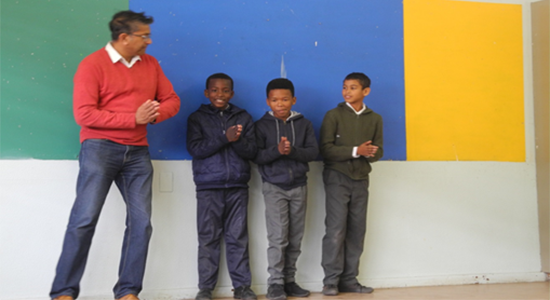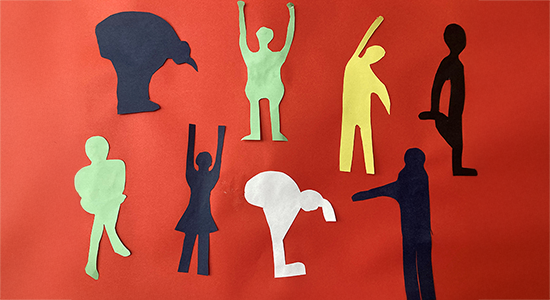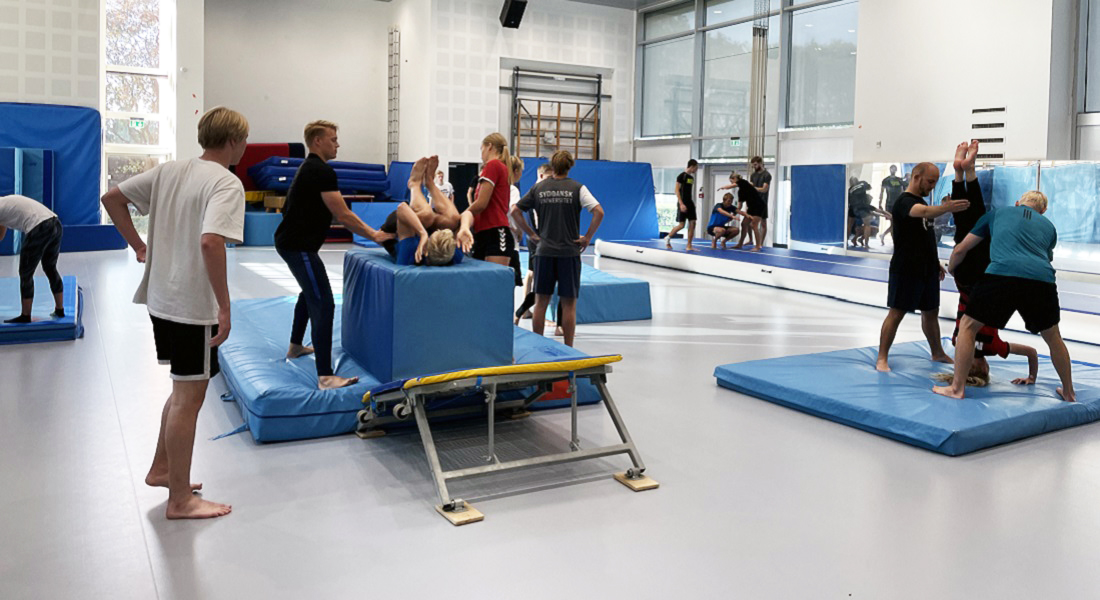THEME
Embodiment, culture and education

The theme focuses on research questions related to education in formal and non-formal sectors as defined by UNESCO as well as further training of practitioners in education.
On-going research centers on embodied and intercultural teaching and learning in movement and dance and in arts-integrated education. Projects take place in Denmark and with partners internationally.
Research projects

The research project aims to develop models for integrating arts in the curriculum in Denmark and in South Africa building on partnerships of ambassador teachers from different schools through so-called ”Teacher Twinning.”
The project will explore and document what value arts-integrated teaching building on ideas and methods developed in previous school projects in collaboration of the project partners has to teachers, children and for reaching objectives of national curricula.
The project will produce knowledge about how to stimulate the implementation of arts and cultural education in reaching the UN Sustainable Development Goals 2030, specifically goal 4.7. about quality education. Moreover, it will develop new methods for teaching in multicultural settings based on arts-integration in various school subjects.
The outcome of the project will also include teaching material and workshops for teachers that can be implemented at national level in both countries.
Publikationer
Svendler Nielsen, C. & Samuel, G.M. (2025). Embodied-artistic pedagogy creating hopeful educational spaces in times and places of crises and trauma. International Journal for Research in Cultural, Aesthetic and Arts Education, 2(1).
Samuel, G.M. & Svendler Nielsen, C. (2022). Desiderata: Dancing social cohesion in Cape Town (pp. 146-158). In C. C. Carter & R. Benza Guerra (Eds.), Educating for peace through theatrical arts: International perspectives on peacebuilding instruction. London: Routledge.
Samuel, G.M. & Svendler Nielsen, C. (2022). Conversations: Changing life perspectives through a microtopia of integrated arts education in a South African Primary School (pp. 109-122). In K. Jones (Ed.), Doing Performative Social Science: Creativity in doing research and reaching communities. London: Routledge.
Svendler Nielsen, C. & Samuel, G.M. (2022).’É tudo uma questão de arte!’ Atravessar as fronteiras da academia e da práctica artística num projeto educativo integrado na área das artes na Africa do Sul. L. Veloso & C. Quintão (Eds.), Sábado: Aprendizagens no cruzamento entre arte, educacão e cidadanía (pp.136-145). Alkantara & Fundacão Calouste Gulbenkian.
Collaboration partner
University of Cape Town, South Africa
Funded by
Project period: 2021 - 2025.
Contact
Associate Professor Charlotte Svendler Nielsen
The research project builds on this earlier project
Arts-integrated and intercultural learning focusing on sustainable development in Cape Town and Copenhagen
The project explores connections between awareness of climate change, culture and dance and visual arts as different forms of expression.
It involves school children in Cape Town and Copenhagen as well as artists, teachers and researchers from both cities.
It is related to the UN 2030 Goals for Sustainable Development as it focuses on how culture and nature are phenomena that influence each other, what are similarities and differences South and North of the Equator.
The project seeks to answer what children can learn through such collaborations about themselves, others and their surroundings and how connections can be created between the children’s experiences and expressions, both in artistic formats and as alternative forms of reflection.
Publications
Svendler Nielsen, C., Hartman, L. & Samuel, G.M. (2022). An embodied perspective of resilience: The impact of integrated arts education on experiences of South African primary school children post COVID-19 lockdown. Culture Crossroads, 20, 20-45.
Wilson, L., Vedel, K.A., Samuel, G.M. & Svendler Nielsen, C. (2021). Getting to the core of Red Apples-Green Apples: A Dance and Visual Arts Learning Project between South Africa and Denmark. Intercultural Education, 32(6), 682-690.
Svendler Nielsen, C., Samuel, G.M., Wilson, L. & Vedel, K.A. (2020). ‘Seeing’ and ‘being seen’: An embodied and culturally sensitive arts-integrated pedagogy creating enriched conditions for learning in multi-cultural schools. International Journal of Education and the Arts, 21(2), 1-23.
Svendler Nielsen, C. & Hartman, L. (2020). Advancing our futures – educational potential of interdisciplinary artistic projects to children ‘at-risk’ in Denmark and South Africa. Policy Futures in Education, 18 (3), 410-431.
Svendler Nielsen, C. & Samuel, G.M. (2019). Intercultural teaching and learning in dance and visual arts: Co-creating an artistic-educational space among South African children and artist-educators from Cape Town and Copenhagen. International Journal of Critical Pedagogy, 10(1), 98-117.
Svendler Nielsen, C., Samuel, G.M., Vadim, P., Hartman, L., Hartzenberg, F. & Gerlach-Hansen, O. (2021). A microtopia of arts education: International sustainable development policy brought to live in an educational project involving institutions in South Africa and Denmark (pp.173-193). In E. Wagner, C. Svendler Nielsen, L. Veloso, A. Suominen & N. Pachova (Eds.), Arts, sustainability and education. Yearbook 2 of the European Network of Observatories in the Field of Arts and Cultural Education(ENO). Singapore: Springer Nature.
Svendler Nielsen, C., Samuel, G.M., Vadim, P., Hartzenberg, F. & Hartman, L. (2020). ‘It’s all about art!’ Crossing borders of academia and arts practice in an arts-integrated educational project in South Africa. In C. Svendler Nielsen & S. Burridge (Eds.), Dancing across borders: Perspectives on dance, young people and change (pp.17-30). London: Routledge.
Svendler Nielsen, C. & Samuel, G.M. (2019). Dance pedagogy and arts integration: Access and inclusion. In S. Friedman (Ed.), Dance, (e)merge, Theatre: Proceedings of the 10th Confluences Conference 29-31 August 2019, University of Cape Town, South Africa (pp.163-171). Cape Town: Centre for Theatre, Dance and Performance Studies.
Partners
University of Cape Town School of Dance
Peter Clarke Art Centre i Cape Town.
Funded by
Danish Agency for Higher Education and Science
Danish Agency for Culture and Palaces
Municipality of Copenhagen
Project period: 2017 - 2020.
Contact
Associate Professor Charlotte Svendler Nielsen
This project focus on the ways in which democratic, empowering, and challenging dance courses may advance university students’ dance skills, pedagogic consideration, existential learning processes, and embodied leadership with regard to their roles as future physical education teachers.
These movement psychological-inspired transformational and empowering educational methods may also give possibilities regarding broader educational issues.
Publications
Winther, H. (2020). Let's move: Embodiment, leadership, and dance in education. I M. B. Tin, F. Telseth, J. O. Tangen, & R. Giulianotti (red.), The Nordic Model and Physical Culture (p. 51-67). Routledge. Routledge Research in Sport, Culture and Society.
Winther, H. (2018). Dancing Days with Young People: An art-based coproduced research film on embodied leadership, creativity, and innovative education. International Journal of Qualitative Methods, 17/1 (Special Issue: Exploring Innovations in Elicitation Methods), p. 1-10.
Dancing Days with Young People
The film "Dancing Days with Young People" follows one teacher, 21 students and 200 high school students through an innovative and challenging teaching course that focuses on dance, creativity, body, and leadership.
The documentary lasts 12 minutes and was created in collaboration between film director Helle Toft Jensen and lecturer Helle Winther.
Funded by
Spor Media
Project period: 2018 - 2026
Contact
Associate Professor Helle Winther

The research project Embodied Language Learning through the Arts (ELLA) explores how language, artistic activity and embodied learning can be intertwined and how embodied language learning through the arts can contribute to meaningful changes in educational practices.
The ELLA project includes three subprojects: Early ELLA, Culturally Diverse ELLA and Multiprofessional ELLA. University of Copenhagen is involved in Multiprofessional ELLA.
Publications
Anttila, E., Hannuksela, R., Jusslin, S., Korpinen, K., Lehtinen-Schnabel, J., Lilja, N., Svendler Nielsen, C. & Siljamäki, M. (2024). Embodied Language Learning through the Arts: Insights, results, and policy recommendations/Kehollisuus ja taide kielen oppimisessa: Oivalluksia, tuloksia ja suosituksia/ Kroppsligt språklärande genom konst: Insikter, resultat och policyrekommendationer. University of the Arts Helsinki.
Jusslin, S., Korpinen, K. Hanuksela, R. & Svendler Nielsen, C. (2024). Embodied and arts-integrated languages and literacies education in class teacher education: Becoming-teachers’ diffractions of opportunities-and-challenges. Journal of Applied Language Studies, Special Issue: Arts and embodiment in language education, (18)3, 125-152
Partners
University of the Arts Helsinki (lead partner)
Åbo Akademi University
University of Turku
Jyväskylä University
Tampere University
Norwegian University of Science and Technology
University of Copenhagen
Funded by
KONE Foundation
Project period: 2021 - 2025.
Contact
Associate Professor Charlotte Svendler Nielsen
A study of lived experiences from ball-game education in a university program in Denmark
The PhD project is based on a hermeneutic phenomenological study of lived experiences (van Manen, 1990) from ball game education in a university program in Denmark.
The aim of the thesis is to illuminate students’ experiences and to use the insights to develop didactic focus points for the teaching of ball games in the future. This is done through observation, interviews and lived experience descriptions from an educational setting involving many students and over a number of years.
The analysis will lead to insights of themes that are key to understanding a diverse range of students’ experiences, from those who have experience in ball games to those who do not and find the area challenging for different reasons.
Through the creation of awareness of this wide range of different experiences and didactic focus points that can help to involve all students in meaningful ways, the research has the potential to give more students positive experiences.
It also has potential to support future students including in other PE programs to become more reflective about the variation of experiences in the field of ball games which possibly can lead to sustained involvement in the field for more and support better ball game teaching of future teachers in high schools.
Contact
Steen Ingemann Jørgensen
PhD student
The aim of this project is to explore how gymnastics is taught in the BA programmes in PE at Danish universities, and how this connects to the practical reality of the students’ future work life – especially as high school teachers.
Central research questions
- How is gymnastics taught in the BA programmes in PE at Danish universities and why?
- How does the curriculum connect to the practical reality of the students’ future work life – especially as high school teachers?

Gymnastics has historically played a large role in the development of PE in Denmark. Today gymnastics is still a central part of the national curriculum for PE in primary and lower secondary school, but in high school PE gymnastics is optional and can be included as part of the mandatory subject area “classical and new sports”.
At the four Danish universities that have a BA program in PE gymnastics is part of the mandatory curriculum, but the emphasis on it differs. There is no universal definition of gymnastics, but the focus of this study lies mainly on apparatus work.
The aim of the project is to explore how gymnastics is taught in the BA programmes in PE at Danish universities and why, as well as how the curriculum connects to the practical reality of the students’ future work life – especially as high school teachers.
The analysis applies a combined sociological and pedagogical perspective, drawing theoretical inspiration from, among others, Norbert Elias. Qualitative methods are used for data collection in this project (i.e. interviews, observations, and document analysis).
This project will contribute with specific knowledge about
- the gymnastics curriculum in the BA programmes in PE,
- the connection between theory and practice in PE,
- research based teaching in practical courses in BA programmes in PE, and
- the interplay between university education and labour market needs.
The project started in October 2020 and is expected to be completed in late 2025.
When articles related to the project are published, they will be featured on this page.
Contact
Andorra Lynn Jensen
PhD student
